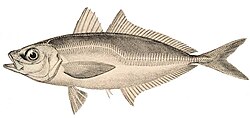| Selar | |
|---|---|
 | |
| Bigeye scad (S. crumenophthalmus) | |
| Scientific classification | |
| Kingdom: | Animalia |
| Phylum: | Chordata |
| Class: | Actinopterygii |
| Order: | Carangiformes |
| Suborder: | Carangoidei |
| Family: | Carangidae |
| Subfamily: | Caranginae |
| Genus: | Selar Bleeker, 1851 |
| Type species | |
| Caranx boops | |
Selar is a genus of ray-finned fishes from the family Carangidae which includes the scads, jacks, pompanos, trevallies and horse mackerels. [2] The generic name, Selar, is the local name for the oxeye scad in Jakarta. [3]
